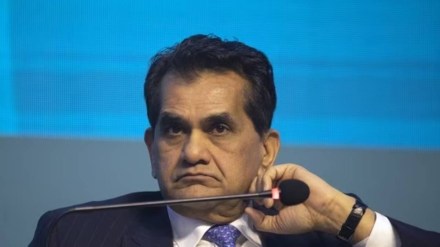Amitabh Kant, G20 Sherpa and former CEO of Niti Aayog, has said that inappropriate sovereign credit ratings were a big hurdle in India’s growth plans.
It is a critical issue that impacted India and the entire global South, he added. S&P and Fitch continue to rate India at BBB, while Mody’s Ratings maintains a Baaa3, Kant said at the CareEdge Ratings’ Conversations 2024 conference to discuss ‘Global capital flow and risk in a changing world order’ in Pune.
These ratings were the lowest possible investment grades for a developing economy and did not objectively assess India’s strong economic fundamentals, he pointed out.
India’s macroeconomic developments are not reflected in the many credit ratings by the Western agencies that use very opaque grounds for sovereign ratings, he said.
“These misrepresented credit ratings are binding constraints for developing economies as they hinder the ability to attract necessary funds for growth, development, and even the fight against climate change,” Kant said.
“Sovereign ratings currently act as a ceiling and restrict the flow of necessary funds and they increase borrowing costs and adversely impact the bargaining power of developed countries. Therefore there is a need for a pro-global South agenda,” he added.
There have been significant reforms in the country in the last few years to fastrack growth with twin balance sheet problems handled. But this progress of India’s growth story, both corporate balance sheet and improving bank balance sheet is not reflected in the country’s sovereign credit ratings. The ratings have remained static despite the ascent from the 12th largest economy in 2008 to the fifth largest today and the second-highest growth among comparative economies. The country’s ratings have remained stagnant, he said.
He highlighted that the country has never defaulted, has $600 billion in foreign exchange, and its capacity to repay external debt was exceptional and robust.
The methodologies employed by global credit rating agencies heavily rely on subjective indicators of governance and political stability, which account for around 20% of the sovereign rating.
Kant listed the problems with these methodologies and said that many data sources were unpublished making complex calculations that were not replicable, some data sources did not consistently yield coherent governance indicators and the aggregation of six governance indicators into a comprehensive measure of a country’s governance is highly questionable and non-transparent. It fails to represent either willingness or ability to pay.
“All three agencies fail to clearly distinguish between ability to pay and willingness to pay, required for an accurate assessment of sovereign creditworthiness. Assessment by these agencies that developing countries are risky investments is not solely based on an objective financial matrix but is significantly influenced by subjective assessment,” he said.
“The additional cost that emerging markets incur is not purely a reflection of actual risk but is the result of perception premium. The perception premium is the cost of a subjective view of many credit ratings that unfairly paralyses a developing country,” he said.
If private finance has to play a key role then there was a need for homegrown credit agencies such as Care which is vital for fair assessment of developing nations, he said.
Kant suggested greater accuracy and transparency in credit rating that would unlock new avenues for capital flow which called for addressing the biases in sovereign credit ratings, mobilising global financing, and promoting homegrown rating agencies are essential steps towards an equitable world.
The country should be able to use per capita metric in purchasing power parity terms and provide a more accurate reflection of an economy’s fundamentals, he said.
